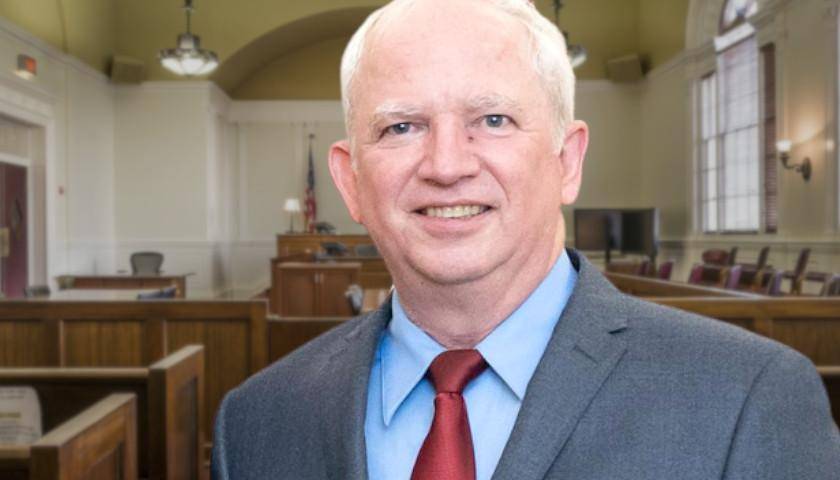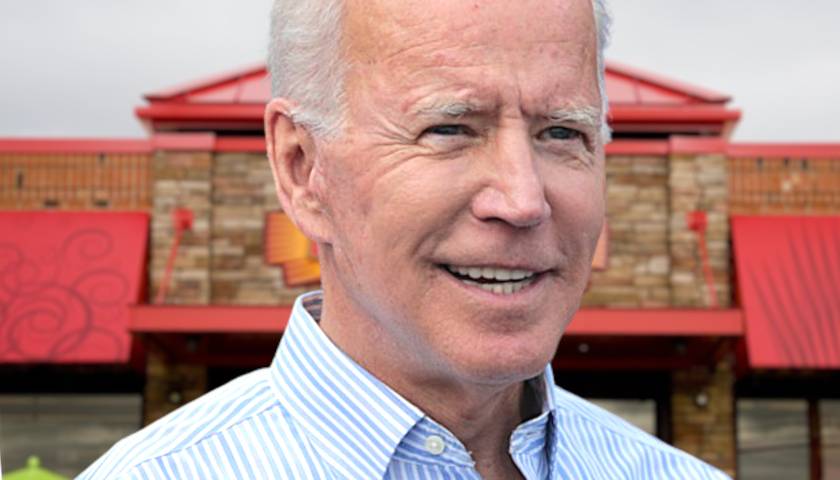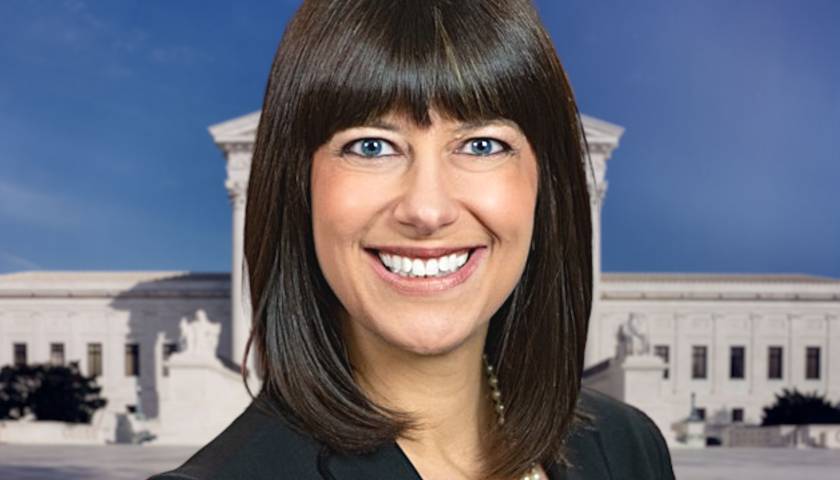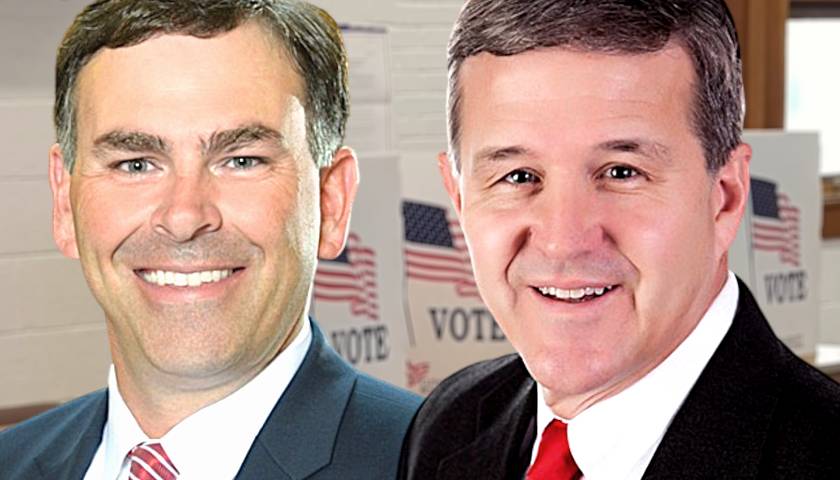Trump’s former attorney and constitutional legal scholar, John Eastman, who is undergoing lawfare as a result of his representation of Trump in the 2020 election challenges, is facing multiple legal proceedings but is in good spirits.
Eastman (pictured above), widely considered one of the top legal scholars on the right, who founded the Claremont Institute’s Center for Constitutional Jurisprudence, served as dean for Chapman University’s Dale E. Fowler School of Law, and clerked for Supreme Court Justice Clarence Thomas, told The Arizona Sun Times during an interview that he remains “cheerful but defiant.”
The State Bar of California conducted a disciplinary trial to disbar him last year, and he is now awaiting the final outcome from California Bar Disciplinary Judge Yvette Roland, who contributed to Democrats while serving as a judge. Eastman is one of the defendants along with Trump and others in Fulton County District Attorney Fani Willis’s RICO prosecution. He is also an unnamed co-conspirator in special counsel Jack Smith’s federal case against Trump, which means it may not result in prosecution.
The legal actions against Eastman mainly come down to a short memo he gave to Trump that provided several options for dealing with the illegal activity in the 2020 election. During the disciplinary trial, it came out that contrary to the State Bar of California’s contention, Eastman did not urge then-Vice President Mike Pence to reject electoral slates from states with suspected election fraud; instead, he suggested Pence could merely delay accepting them. It also came out that historically, vice presidents have exercised substantive authority when choosing to accept or reject electoral slates; their role is not purely ministerial, as the California Bar claimed.
The Los Angeles Times, which extensively covered the disciplinary trial, conducted a two-hour-long interview with Eastman recently. The reporter repeatedly asked him to describe how miserable he felt, but instead Eastman told him he is in great spirits. He said, “We’re in a war over whether we’re going to be free or not. I have ended up on the front lines and it’s an honor. It’s the fight for our times.”
The reporter didn’t get the story he sought because the interview was never published.
The Sun Times asked Eastman why he, unlike so many other leading conservative legal academics, chose to get involved with the 2020 election challenges helping Trump. He said Trump personally called him and asked him to help. He said watching the election corruption occur convinced him to get involved.
“What I saw was wrong,” he said, “It undermined the consent of the governed.”
Eastman said attorneys from big, powerful law firms were too afraid to get involved due to the cancel culture. Within five minutes of the voice of election integrity attorney Cleta Mitchell being identified on a key Georgia conference call where Trump discussed with election officials what could be done about the illegal activity, progressive activists went after her law firm. They ultimately forced her to resign.
Mitchell told The New York Times that progressives engaged in “a massive pressure campaign in the last several days mounted by leftist groups via social media and other means against me, my law firm and clients of the law firm.” She was employed by the Washington, D.C. office of Foley & Lardner.
Eastman explained that the site Martindale Hubble lists the major clients of large law firms, so activists contact employees at those businesses and get them to flood the law firms with complaints. Activists also scour the Democratic donor lists provided by Act Blue to discover who contributes to those businesses and contact them to get them to complain to the businesses.
He said this is because it’s not just about disbarring conservative attorneys; it’s about destroying them completely within their communities. Eastman cited an Axios interview with progressive activist David Brock. Brock is driving much of the efforts targeting conservative attorneys, advising The 65 Project, which is an organization that attempts to “hold accountable the lawyers who raise fraudulent claims to overturn legitimate elections results.”
Brock told Axios that the group’s approach is to “not only bring the grievances in the bar complaints, but shame them and make them toxic in their communities and in their firms.” He explained why they were going after so many attorneys, including little-known ones.
“I think the littler fish are probably more vulnerable to what we’re doing. You’re threatening their livelihood. And, you know, they’ve got reputations in their local communities,” he said.
While Eastman could not discuss much of the ongoing cases against him due to confidentiality, executive privilege, and other legal reasons, he noted that former Attorney General Ed Meese and two law professors submitted an amicus curiae brief to the U.S. Supreme Court in December 2023 arguing that Smith’s appointment was unconstitutional. Along with Steven G. Calabresi of the Northwestern University Pritzker School of Law and Gary S. Lawson of the Boston University School of Law, Meese told the court, “Improperly appointed, he has no more authority to represent the United States in this court than Bryce Harper, Taylor Swift or Jeff Bezos.”
The trio said Attorney General Merrick Garland “exceeded his statutory and constitutional authority” when he appointed Smith in November 2022. They said federal law allows the attorney general to appoint attorneys to assist U.S. attorneys but not to replace them. The appointments clause requires all federal offices “not otherwise provided for” in the Constitution to be established by law, but no law establishes a special counsel. The appointments clause requires presidential nomination, Senate confirmation and presidential appointment for federal officers, which didn’t occur with Smith.
Should Roland recommend disbarment, Eastman could appeal up through the court system beginning with the California Supreme Court, which is composed of all Democrats. A constitutional scholar told The Sun Times previously that Eastman’s case appeared to have been presented with the U.S. Supreme Court in mind, emphasizing federal issues that the court would be interested in. Eastman estimates he needs $3 million to defend himself in the multiple proceedings and has raised $630,570 so far.
– – –
Rachel Alexander is a reporter at The Arizona Sun Times and The Star News Network. Follow Rachel on Twitter / X. Email tips to [email protected].
Photo “John Eastman” by John Eastman Defense Fund.




